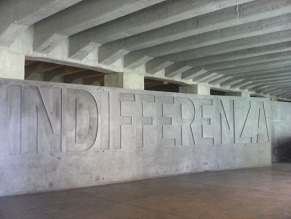|
World Jewish News

At the entrance to the Memorial, the word ''Indifference" stands out. Liliana Segre, a survivor and witness of the Shoah, has chosen this word because its was the indifference of the silent majority that allowed the extermination of the Jew
|
Controversy around the Milan Shoah Memorial's initative to put its premises at the disposal of refugees
21.08.2017, Jews and Society For the third consecutive summer, the Foundation of the Memorial of the Shoah in Milan, in collaboration with the Community of Sant'Egidio, put its premises at the disposal of 35 refugees every night.
The Memorial is situated in the Milan Central railway station, at the Binary number 21, in the place where between 1943 and 1945 thousands of Jews captured all over Italy were loaded on freight wagons and sent to the death camps in Auschwitz-Birkenau, Bergen Belsen and to the Italian camps of Fossoli and Bolzano.
At the entrance to the Memorial, the word "Indifference" stands out. Liliana Segre, a survivor and witness of the Shoah, has chosen this word because its was the indifference of the silent majority that allowed the extermination of the Jews in the heart of Europe.
From the year 2015, when the project began, the Memorial offered shelter and asylum to 6,350 refugees - men, women, children - from Eritrea, Syria, Sudan and other 23 countries, giving them brandies, hot meals and toilets, in addition to the warmth and the willingness of the volunteers of the Community of Sant'Egidio, responsible for coordination and management of the reception.
"It is in historical moments like this, where it is increasingly difficult and more and more necessary to respond to the needs of migrant people to find decent living conditions and build societies that can accept them, without prejudice and fear, but recognizing their needs and the rights of all men, that the true spirit of a country and a city can be identified. In particular, Italy and Milan, are showing to all of Europe that welcoming and solidarity are everyday political and administrative practices that give concreteness to formal statements in international treaties, "said the city’s Deputy Mayor Anna Scavuzzo.
The Memorial Foundation of the Shoa opened its rooms on July 16 and will let the refugee use the spaces throughout the summer until September 15.
"The decision to repeat for the third year the experience of reception within these spaces confirms the degree of sensibility and involvement of the Memorial Foundation of the Shoah, the Jewish Community of Milan and the Community of Sant'Egidio towards this emergency which affects Europe, Italy and us all. We feel the moral duty of making people who had to flee from their home feel at home . The Memorial remembers thousands of stories of Jews who escaped, anguished and indifference "commented Roberto Jarach, Vice-President of the Shoah Memorial Foundation in Milan.
The decision to let the refugees enjoy the spaces of the Memorial has been sharply criticized by Giulio Meotti, a journalist of the Italian newspaper Il Foglio who has always stood alongside Israel and the Jews in the struggle against anti-Semitism.
Meotti wrote a post in which he invited the Jewish community to dissociate themselves from welcoming the migrants in the Memorial spaces because it would mean to accept the parallel between the phenomenon of today’s migrants and the deported Jews and by doing so contribute to the ‘’banalization’’ of the Shoah.
"The Jewish community in Milan and the Shoah Memorial took a wrong decision to adhere to the humanitarian campaign on migrants," Meotti wrote in a post on Facebook.
The newspapers and the TV news title this kind of news as 'migrants on track 21'.
‘’The Memorial could be used for demonstrations in favor of persecuted Christians, raped Yazidis or many oppressed minorities by the same enemies of the Jewish people, and not to help the protected migrants,’’ Meotti argued.
Meotti's comments have aroused controversy.
"The welcome to the Memorial of the refugees has been widely supported by the Jwish community of Milan . There sensitivity to the issue of migrants and the help is in our Jewish DNA. Many of us escaped from Libya, Egypt, Syria, Lebanon. as refugees ," said Milo Hasbani, Co-Chairman of the Jewish Community of Milan.
Andrea Jarach, President of Keren Hayesod, and one of the first persons who supported the idea of the Memorial in Milan, wrote in his facebook page: "I have to thank Giulio Meotti because this controversy highlighted the importance of this place. It opened a debate that will help to meditate on the real role of Memory. A place that, in the opinion of those who worked on the project under the inspiration of the surviving witnesses, must be a living laboratory of human solidarity opposed to indifference,’’ he stated.
Stefano Pasta, of the Community of Sant'Egidio, said: "At the announcement of the reception at the Shoah Memorial, this year, there are hundreds of people who have contacted us to help . If xenophobia and hostility can be contagious, solidarity is the same. Since 2013, in the face of the refugee emergency, we are witnessing two Europe: on one side the Europe of walls, spin yarns, repulsions and those who are indifferent to the tragedy of so many refugees; On the other, the Europe of the many who want to help the refugees . Both Europe are both true. "
EJP
|
|
